|
|
|
Sort Order |
|
|
|
Items / Page
|
|
|
|
|
|
|
| Srl | Item |
| 1 |
ID:
104422
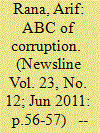

|
|
|
| 2 |
ID:
131507


|
|
|
|
|
| Publication |
2014.
|
| Summary/Abstract |
Two parallel norms mandate an international duty to hold state leaders individually accountable for serious corruption and human rights crimes. The development of these new norms is poorly explained by realist and neoliberal perspectives, but there are also weaknesses in recent constructivist explanations of norm diffusion that emphasize agency at the expense of structure. Such approaches have difficulty explaining the source of and similarities between new norms, and treat norm entrepreneurs as prior to and separate from their environment. In contrast, drawing on sociological institutionalism, we present a more structural explanation of individual accountability norms. The norms derive from an overarching modernist world culture privileging individual rights and responsibilities, as well as rational-legal authority. This culture is more generative of norm entrepreneurs than generated by them. The specific norms are instantiated through a process of "theorization" within permissive post-Cold War conditions, and diffused via mimicry, professionalization, and coercive isomorphism
|
|
|
|
|
|
|
|
|
|
|
|
|
|
|
|
| 3 |
ID:
111013
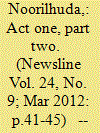

|
|
|
| 4 |
ID:
116054
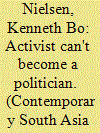

|
|
|
|
|
| Publication |
2012.
|
| Summary/Abstract |
This article explores the ambiguity inherent in the relationship between social activism and politics in West Bengal. I use a detailed account of the career of singer-activist turned politician Kabir Suman to examine the activist's view of himself and of politics, as well of how the porous boundary between activism and politics is both blurred and crossable. The fact that activists possess a kind of political capital useful within the framework of a political party may facilitate their entry into electoral politics. Yet as this article demonstrates, the activist may sometimes only be able to retain his activist credentials by sacrificing his political career. In addition, this article seeks to conceptualise the social activist as a particular type of political figure. I do so by locating the study of Kabir Suman within an emerging body of literature on political leadership in India. I argue that while the case of Kabir Suman may not be paradigmatic, his 'activist' style of leadership challenges certain contemporary classifications of political leadership in India.
|
|
|
|
|
|
|
|
|
|
|
|
|
|
|
|
| 5 |
ID:
081874
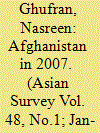

|
|
|
|
|
| Publication |
2008.
|
| Summary/Abstract |
The year 2007 has not brought much hope for Afghans whose country remains in the grip of increasing violence and Taliban insurgency, both hampering reconstruction. The increasing levels of opium production have provided a boost to the growing illicit economy and also to the insurgency. Governmental institutions remain frail and are largely ineffective outside the capital
|
|
|
|
|
|
|
|
|
|
|
|
|
|
|
|
| 6 |
ID:
086676
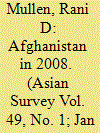

|
|
|
|
|
| Publication |
2009.
|
| Summary/Abstract |
The state-building endeavor in Afghanistan came to the brink in 2008 with the Taliban insurgency taking control of some southern districts, high poppy production fueling the illicit economy, widespread charges of corruption, and a looming humanitarian disaster. Afghans increasingly became disillusioned by high civilian casualties and the government's failure to provide improved socioeconomic conditions. By year's end, there was also increased pressure for negotiations with moderate Taliban elements.
|
|
|
|
|
|
|
|
|
|
|
|
|
|
|
|
| 7 |
ID:
094486
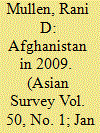

|
|
|
| 8 |
ID:
185670


|
|
|
|
|
| Summary/Abstract |
The African Continental Free Trade Agreement, launched on January 1, 2021, will be Africa’s most ambitious united endeavor to assert financial oversight over the extractive resources sector—if it is fully implemented. The United States can act as a supportive partner, but what matters most is change from within Africa itself to finally realize pan-African visions of economic sovereignty.
|
|
|
|
|
|
|
|
|
|
|
|
|
|
|
|
| 9 |
ID:
130388
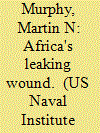

|
|
|
| 10 |
ID:
124591
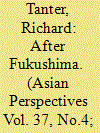

|
|
|
|
|
| Publication |
2013.
|
| Summary/Abstract |
Investigations of the Fukushima nuclear power accident sequence revealed the man-made character of the catastrophe and its roots in regulatory capture effected by a network of corruption, collusion, and nepotism. A review of corruption incidents in the global nuclear industry during 2012-2013 reveals that the Japanese experience is not isolated. Gross corruption is evident in nuclear technology exporting countries such as Russia, China, and the United States, and in a number of nuclear technology importing countries. The survey results make clear that national nuclear regulatory regimes are inadequate and that the global regime is virtually completely ineffective. Widespread corruption of the nuclear industry has profound social and political consequences resulting from the corrosion of public trust in companies, governments, and energy systems themselves.
|
|
|
|
|
|
|
|
|
|
|
|
|
|
|
|
| 11 |
ID:
130866


|
|
|
|
|
| Publication |
2014.
|
| Summary/Abstract |
Curbing corruption is vital for China's future. But the exposure of corruption cases can only damage public confidence in the CCP and the state more generally. Corruption associated with toxic food, bogus medicines, grave abuses of power and criminal 'black societies' has produced a series of public scandals in China. Without reform, further occurrences could rapidly erode the legitimacy not just of the police and other judicial organs, but also of the ruling Chinese Communist Party (CCP). The recent trial of Bo Xilai, the former Chongqing party secretary and member of the party's elite 25-member Politburo, showcased the kind of corruption that China's past president Hu Jintao warned could lead to 'the collapse of the Party and the downfall of the state'. In 2011, the Bank of China inadvertently reported that between 1994-2008 as many as 18,000 corrupt officials had fled the country for destinations in Europe, America and other parts of Asia, plundering an estimated $120 billion from state-owned enterprises and other criminal activities. The costs of maintaining domestic public order have also grown rapidly, and, for the first time, domestic security outlays approved by the 2012 National People's Congress (NPC) exceeded defence, in part over concerns about the growth of mass protests, fraud, corruption and organised crime, and the need to strengthen weiwen (stability) and social harmony.
|
|
|
|
|
|
|
|
|
|
|
|
|
|
|
|
| 12 |
ID:
133689
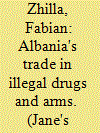

|
|
|
|
|
| Publication |
2014.
|
| Summary/Abstract |
With a new movement attempting to get to grips with organized crime in Albania. Fabian Zhilla examines trends in drug trafficking into Europe and the growth in contract killings arising from a developing market in arms and explosives.
|
|
|
|
|
|
|
|
|
|
|
|
|
|
|
|
| 13 |
ID:
121488
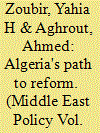

|
|
|
| 14 |
ID:
071927
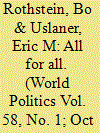

|
|
|
|
|
| Publication |
2005.
|
| Summary/Abstract |
The importance of social trust has become widely accepted in the social sciences. A number of explanations have been put forward for the stark variation in social trust among countries. Among these, participation in voluntary associations received most attention. Yet there is scant evidence that participation can lead to trust. In this article, the authors examine a variable that has not gotten the attention it deserves in the discussion about the sources of generalized trust, namely, equality. They conceptualize equality along two dimensions: economic equality and equality of opportunity. The omission of both these dimensions of equality in the social capital literature is peculiar for several reasons. First, it is obvious that the countries that score highest on social trust also rank highest on economic equality, namely, the Nordic countries, the Netherlands, and Canada. Second, these countries have put a lot of effort in creating equality of opportunity, not least in regard to their policies for public education, health care, labor market opportunities, and (more recently) gender equality. The argument for increasing social trust by reducing inequality has largely been ignored in the policy debates about social trust. Social capital research has to a large extent been used by several governments and policy organizations to send a message to people that the bad things in their society are caused by too little volunteering. The policy implications that follow from the authors' research is that the low levels of trust and social capital that plague many countries are caused by too little government action to reduce inequality. However, many countries with low levels of social trust and social capital may be stuck in what is known as a social trap. The logic of such a situation is the following. Social trust will not increase because massive social inequality prevails, but the public policies that could remedy this situation cannot be established precisely because there is a genuine lack of trust. This lack of trust concerns both "other people" and the government institutions that are needed to implement universal policies.
|
|
|
|
|
|
|
|
|
|
|
|
|
|
|
|
| 15 |
ID:
111892
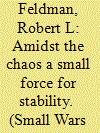

|
|
|
|
|
| Publication |
2012.
|
| Summary/Abstract |
Though parts of Somalia appear mired in intractable conflict, both domestic and foreign trade continues. As a result amidst the conflict, corruption, and chaos Somalia's business community is a small force for peace and stability. Thus, efforts directed at enhancing the business community, possibly via the Transitional Federal Government or its successor, could play a small role in improving the situation in this strategically poised country with a very entrepreneurial population. However, such success is far from certain, and numerous other factors besides a strengthened business community would have to occur for Somalia even to begin the journey on the long road to recovery.
|
|
|
|
|
|
|
|
|
|
|
|
|
|
|
|
| 16 |
ID:
111716
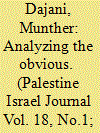

|
|
|
| 17 |
ID:
144173
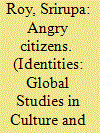

|
|
|
|
|
| Summary/Abstract |
This article examines the emergence of the angry citizen as a legitimate political actor in post-colonial Indian democracy. Approaching such ‘civic anger’ as a historically constituted and socio-politically embedded formation rather than as a subjectively and individually experienced feeling, I show that the rise of the angry citizen was linked to the consolidation of a distinctive politics of curative democracy in the ‘long 1970s’. The lineages of the civic anger of twenty-first century India may be traced to this older formation of curative democracy. The point here is not to offer a chronological revision of the origins of ‘new India’, but to consider the generalisable political implications of the idea of curative democracy, and to identify the distinctive forms of political agency that are associated with the call to cure, reform or renew democracy.
|
|
|
|
|
|
|
|
|
|
|
|
|
|
|
|
| 18 |
ID:
103870
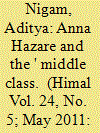

|
|
|
| 19 |
ID:
106906
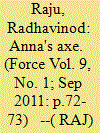

|
|
|
| 20 |
ID:
059606
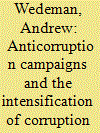

|
|
|
|
|
|
|
|